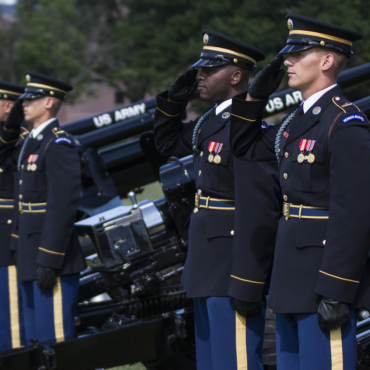
The Art of Building Character – Part II
Conviction is Artwork DANO JUKANOVICH One definition of conviction relates to commitment or dedication or a deep belief in something, but this isn’t the root of the word. Conviction comes […]

Leadership is a potent combination of strategy and character. But if you must be without one, be without the strategy.
Norman Schwarzkopf, US Army General (RET)
The one characteristic of the greatest teams is so uncommon that few even consider it. This may be because none of us really knows how to engineer it. When Seattle Seahawks lineman, J.R. Sweezy takes beating after beating for 60 minutes at a time, day after day, breaking bones and tearing cartilage, it isn’t just for the money and the fame; it’s because he actually cares about running back Marshawn Lynch. He takes the abuse so Lynch doesn’t have to. As popularized in the movie, Lone Survivor, Medal of Honor winner, Lieutenant Michael Murphy of Seal Team 10, having already been wounded multiple times, purposely ran headlong into direct enemy fire in order to reach the high ground where he could call for help for his friends. He completed that call, but was shot again through the chest and back and died. In his research into great companies, Jim Collins, of Good to Great fame, outlines an Aristotelian view of the most effective leaders as “ambitious first and foremost for the cause, the organization, the mission, the nation, the work – not themselves…” It is this virtue of putting others ahead of oneself that makes the greatest leaders and the greatest teams.

A baby comes into the world entirely focused on her own needs being met. For some of us, that’s still the case at 40. Our natural human inclination is not to the self-sacrifice of a Lieutenant Murphy. We are not born selfless. This level of commitment to others is only developed through strenuous practice and guided reflection in the context of decisions that consider others’ interests vis-a-vis our own. We are all, all-the-time, engaged in developing ours and others’ character. In spite of it being true for all of us, it is the Parents, Priests and Generals who see themselves, and whom others see, as primarily in the business of developing this kind of other-orientation in those they lead.
Lieutenant Michael Murphy was dubbed the “Protector” in primary school because he was known for defending the defenseless. Some of us are less virtuously precocious. I went to West Point where the institution’s aim was to develop my character. After nearly two years of having it beat into me (not literally), I finally started to “get it” during a Physical Education class. My identity was heavily wrapped up in having achieved a position as the highest ranked cadet by all measures (physical, military and academic) in my class of over 1,000 at one of the world’s most challenging university programs. I was well aware that ranking would be affected by the grade in that particular PE class. My grade in the class hinged on a final wrestling match against a classmate who was in danger of failing. I had never stepped on other people to achieve, but I had never truly sacrificed my interests for others. I was kind. I helped others, but never to my own meaningful detriment.
My freshman year I was the most “squared away” cadet in my squad – shoes always shined; dates, times, meals, newspaper articles memorized; room cleaned – but I got in trouble because the rest of my squad was often less “squared away.” This sense of individual responsibility was deeply ingrained in me. It defined me. I had always believed that if I just worked hard enough, I could achieve whatever I set my mind to. I didn’t see myself as needing help with much of anything, so it wasn’t intuitive to me that others might. My squad leader pushed me by his example. He shared with me the story of the “Long Gray Line” of cadets to which I would soon belong. He challenged me to make a commitment to a foreign concept of “cooperate and graduate.”
So I started to help the rest of my squad mates. I wasn’t particularly motivated by some compassion or empathy for them. Initially supporting my classmates was entirely out of my self-interest, to receive a high rating by my squad leader, or to avoid some form of demerits. I would get up a little bit earlier and get myself, my bed and my room ready, allowing a few extra minutes to help others. Although the motivation remained self-preservation or advancement, looking out for my squad mates’ interests became a behavioral habit learned through discipline.
Morally right or wrong, I threw that wrestling match in my sophomore PE class. I purposely let my classmate win. Nobody knew. Through this character building process that the generals at West Point have spent over two hundred years perfecting, the habits I had developed out of discipline and a sense of self-preservation, in that moment turned into a genuine act of Justice, where I sacrificed something dear to me for someone else. It was even less painful than I expected because my identity had begun to be defined in context of my team as opposed to myself.
It wasn’t a one-time leap from self-preservation to that fateful wrestling match. It was countless opportunities to practice making such choices, to have been taught to think about my teammates ahead of myself, and each time to have that choice assessed formally or informally by respected teammates and leaders. It was easy for me to work a little harder, to get up a little bit earlier in order to have extra time to help classmates, but still be able to demonstrate my own excellence. My roommate was invariably late in spite of me doing everything I could to help him. With roll call about to start and him still tying his shoes, it was a Catch 22. I could go down to the quad without him and be in trouble for not being a team player or I could wait for him and go down late and be in trouble for being late.
The proverbial playground fight is a more broadly accessible analogy. Everyone has gathered into a circle around the scuffle. Maybe we feel like it’s not our place to do or say anything – we have no idea why they’re fighting and we don’t know either of them. But then we see the bigger kid start to get the better of the smaller, weaker kid. Now he’s really hurting him. We can jump into the middle to try to stop it or we can keep watching or walk away. There’s a clear trade-off between personal safety and helping the kid who is getting badly beat up. Do we sign the petition on Facebook for a favorite cause in spite of likely ridicule from our “friends?” Do we move into a neighborhood where people are different from us because we believe we and they will be better for knowing each other, in spite of the discomfort of unfamiliarity? Do we share our seat on the bus with the person who looks scary and smells funny? They are all hard choices.
Left to our natural inclinations, we default to the self-interested path. In contrast, cadets at West Point are never left alone. The entire four years is built around them experiencing character-stretching challenges within the context of community. Cadets analyze, discuss and evaluate the circumstances and their actions with the help of a supportive community with shared values under the watchful eye of exemplary leaders. West Point’s mission is “to build leaders of character…” That translates into one consistent message throughout four years of engineered moral dilemmas – to put others ahead of yourself. Thus far we’ve been talking about a definable, replicable, paint-by-numbers method to other-oriented character building. That’s the easy part.

Conviction is Artwork DANO JUKANOVICH One definition of conviction relates to commitment or dedication or a deep belief in something, but this isn’t the root of the word. Conviction comes […]
Copyright Invoke Media | Copyright 2020
Post comments (0)